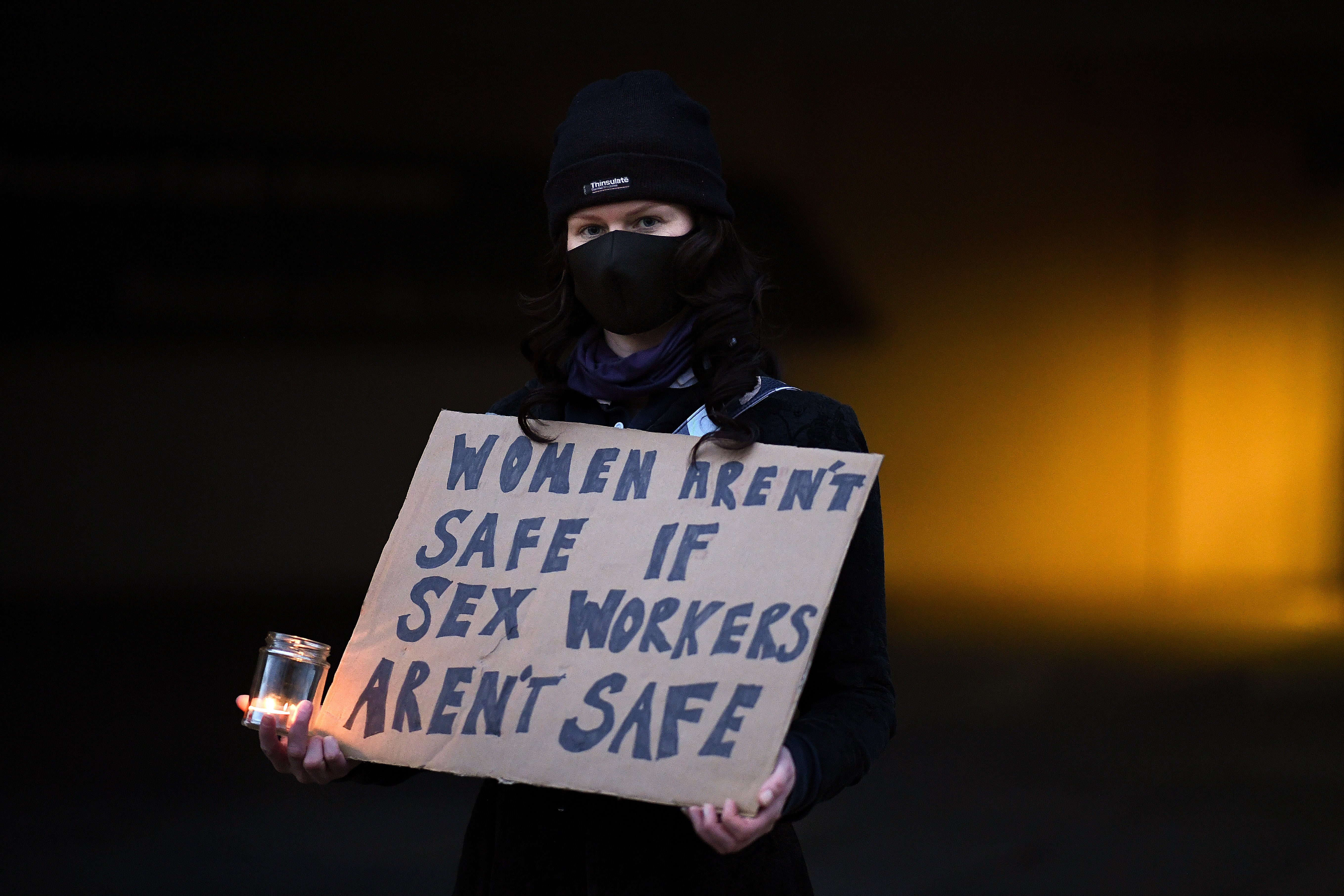MPs must not criminalise sex work through the policing bill, warn campaigners
It is not presently illegal for individuals to buy or sell sex, writes Maya Oppenheim


The government must not implement proposals to criminalise sex work through the controversial policing bill, campaign groups have warned.
Dame Diana Johnson, Labour MP for Kingston upon Hull, has called for amendments to the Police, Crime, Sentencing and Courts Bill which would criminalise buying sex and the websites where sex workers advertise.
An open letter, seen by The Independent, signed by leading organisations such as Amnesty International, Liberty, Stonewall and Sisters Uncut, warned evidence shows such measures would actually worsen violence against women.
It is not presently illegal for individuals to buy or sell sex from each other, but soliciting and sex workers banding together as a group are outlawed.
The letter, led by campaign group Decrim Now and and signed by unions GMB and United Voices of the World, notes sex workers and the World Health Organisation are firmly against laws that criminalise buying sex. Such laws are known as “the Nordic Model’ after they were first introduced in Sweden.
Abby*, a sex worker based in London, said: “I’ve been a sex worker for almost 10 years and have held back from reporting abusive clients because I’m worried I’d be arrested myself.
“If criminalising clients increases violence against sex workers like me then why is this evidence being ignored by MPs? How do they justify not listening to sex workers when we say we are harmed by criminalisation?”
Statistics from UglyMugs – an app where sex workers can confidentially report incidents of abuse and crime – state the number of such incidents being reported has greatly increased since Ireland banned the purchase of sexual services. They say crime against sex workers has increased 90 per cent, while violent crime specifically has increased 92 per cent.
While a two-year evaluation of equivalent legislation in France discovered 42 per cent of sex workers were more exposed to violence and 38 per cent have found it increasingly difficult to make sure men use condoms.
Speaking to The Independent in December, Niki Adams, a spokesperson for the English Collective of Prostitutes, raised grave concerns about similar legislation Dame Johnson introduced to parliament at the end of last year which aims to criminalise purchasing sex and decriminalise selling sex.
Ms Adams, whose leading campaign group supports the decriminalisation of prostitution, warned the measures would ultimately put prostitutes lives in danger, as it means sex workers are unable to screen clients like they presently can, due to customers worries about being arrested meaning they will not provide their details.
Ms Adams said: “It says it is going to decriminalise selling sex but where this legislation has been introduced in other countries, such as in Sweden, Norway, France and Ireland, sex workers are still routinely arrested and violent attacks against sex workers have increased. This is because women have been pushed into more isolated areas and forced to work alone in greater danger.”
FKA Twigs, a musician, who signed the letter, said: “I ask my colleagues to listen to sex workers and to look at the evidence: criminalisation of the sex industry – including the criminalisation of the purchase of sex – will hurt the most vulnerable.
“Sex workers, particularly those from already marginalised groups, need workplace rights, access to benefits, housing and safe migration routes; not further enforcement from the police.”
The letter states evidence shows criminalising advertising of sexual services on the internet compounds harm for sex workers - noting that when similar laws were rolled out in America, women were pushed into more dangerous work and services which help sex workers witnessed a radical surge in violence.
“In countries that have brought in the Nordic Model, sex workers have not, as is often promised, been ‘decriminalised’,” says the letter. “Brothel-keeping – which is defined as two or more people working together – remains a crime, forcing women to work alone or risk arrest. When police raid workplaces with the stated aim of arresting clients, it is repeatedly sex workers who are charged. This has happened in Ireland, Norway, Finland, and Sweden.”
The letter hits out at the much-repeated claim that criminalising buying sex, which is the view championed by Ms Johnson, will help those who have been subjected to trafficking by cutting prostitution - instead arguing trafficking is not triggered by the demand for sex, but by poverty and destitution.
It adds: “The solution, therefore, is not to further criminalise sex work, just as other industries where trafficking occurs are not criminalised.
“But to ensure people have legal ways to migrate, have routes out of poverty, and are empowered to seek support from authorities without the fear of penalty such as detention, deportation or destitution.”
The Independentpreviously reported increasing numbers of women are turning to sex work for the first time as the pandemic pushes them into “desperate poverty”.
*Name changed to protect identity
Join our commenting forum
Join thought-provoking conversations, follow other Independent readers and see their replies
Comments
Bookmark popover
Removed from bookmarks